
It is so often the way with collecting. Dip a toe in the water and before you know it you’re practically getting ready to swim the Channel. That’s how it was for British Cycling president Bob Howden. He began collecting bikes in 2019, with the modest and rather noble goal of amassing one machine for each of the four decades in which he raced. He reached that target quickly – and simply kept on going. Five years later, he has 37 machines adorning the walls and floor of his “man cave”, with more frames ready to be built up.
(Image credit: Future)
“I’ve always been interested in anything that involves workmanship,” says Howden. “Even simple things like furniture, just looking at how things are made. So in terms of frame building, nice details, quality stuff, it just became a process of collecting bikes that I liked. It outgrew itself really.” The 69-year-old Yorkshireman has sourced bikes from a wide range of manufacturers from all kinds of places. He has a Viking like the one he had when he was 13. He has a Holdsworth in the classic blue and orange Seventies team livery. He even has the Gios Compact Pro that he raced on back in the Nineties – the only machine left over from his racing days. Some he has found in collector’s condition. Others have been battered and unloved, in need of restoration. And yes, he has his favourites.
“My second bike as a 14-year-old was a Holdsworth Equipe, which was a sports bike replica of the Holdsworth Campagnolo team bikes,” he tells us. Now he has the real thing. “I got the opportunity to buy [team rider] Gary Crewe’s Holdsworth Pro bike. There was very little to do to it. It came from a collector, and now it takes pride of place in my man cave.” Why is it his favourite? “It’s iconic,” he says, “and I was always a big fan of the Holdsworth Campagnolo team in the Seventies.”
The days of DIY
With his BC presidency following a 24-year racing career, Howden has spent a lifetime in cycling. He is a commissaire too and the longtime organiser of the Ryedale Grand Prix. In 2015 he was awarded an OBE for services to cycling. Beyond bikes, he has also found time to found and manage his company, Grass Concrete Ltd, which he’s still running today. “It’s fair to say that I’ve never asked for a job in cycling, but I seem to have acquired them over the years,” he says.
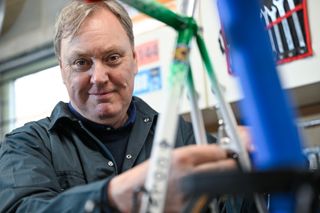
(Image credit: Future)
Howden has a clear love for nostalgia and simpler times when you could take apart and rebuild a pro road bike with a simple toolkit. “I’ve always built my own bikes,” he says, “since being 14 years old. Back then, it’s what you did. You didn’t tend to buy complete bikes, you built them and adapted them. For Campagnolo, it used to be a six-millimetre Allen key, a peanut spanner for the bottom bracket, some decent spanners and you were away.” It’s a far cry from some of the specialist tools required these days to assemble and fettle a bike. Most of Howden’s vintage bikes are dressed with Campagnolo, although that’s not because of the tools. He was a “Campagnolo man” back when he was racing. “The majority of them are Campagnolo,” he says of his collection. “I’ve got bits of Shimano and various other pieces, and my go-to [modern] bike is a Cervélo R5, and that’s got Shimano on it.”
Retro root-around
While the old cycle components may only require a simple toolkit, sourcing those components these days as a collector can be a more complex matter. “It can be very difficult,” he says. “As an example, I raced on my first pair of Campag brakes in 1973; if I bought those same brakes again now, I’d be paying probably four or five times the price I paid for them back then, as the Campagnolo equipment tends to appreciate in value. The iconic Nuovo Record chainset is still worth quite a lot of money. That was what everyone tended to ride back then.” Indeed, a quick glance through eBay listings yielded Nuovo Record chainsets listed at anything from £80 to £450.
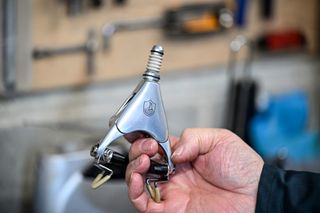
(Image credit: Future)
Howden’s old racing buddy Dave Marsh, who runs Universal Cycle Centre in Rotherham, South Yorkshire, is a key source of vintage items. Otherwise it’s cycle jumbles, or eBay. “You have to look at the prices,” Howden says. “There’s such a vast difference in prices, as well as checking on quality, that’s another factor. I’ve got a good collection of equipment now.” He tells me how one of the trickiest things to source are tyres – ones that stay inflated, anyway. “Finding period tyres is a major challenge.” He hunts for Clements and Vittorias, which go back to the Seventies and Eighties. “It’s a rarity to find any that will inflate and hold air from that period. The rubber tends to be OK, it’s the sidewalls that perish.” A decent pair of period tyres costs £70-80, Howden says, adding: “Whether I’d actually want to ride any distance on them is another matter.”
The latest race content, interviews, features, reviews and expert buying guides, direct to your inbox!
Thankfully, then, Howden’s classic machines are not required to cover long distances. Occasionally he gives them “a run out” but generally they are hung on walls and displayed around the room at the back of his garage – a big space that is rapidly filling up. “I might need to migrate some of them to my office,” he says. Not every bike that Howden restores stays in his collection. He tells me about one particularly special one that went on to help young GB riders. “It was an Ellis Briggs, on eBay with a Fanini-pantographed Campagnolo chainset,” says Howden. “I recognised the chainset as probably being Dave Rayner’s. So I bought the bike and authenticated it with Dave’s dad John, had it resprayed, did all the equipment up and then put that into the Rayner Foundation Auction. It raised a good chunk of money for the fund.”
Keeper of the flame
One key aspect of cycle collecting not mentioned so far is how much it costs. “I don’t really add them up individually – it’d probably scare me off ,” he jokes. “The Holdsworth, because of its rarity, is probably worth anything up to a couple of thousand. The Viking Severn Valley is probably worth £1,000ish.” Does he regard these bikes as an investment? “As a money-making exercise, it doesn’t really stack up,” he shakes his head. “But I don’t do it for that. For me, it’s about perpetuating a style of bike. If eventually they end up in a museum, I’ll have done my bit to let future generations see what styles of bike were used back in the day.”
By comparison to brand new modern machines, therefore, classic bikes are eminently aff ordable. So go ahead, eBay is open for business. Just don’t get carried away…
Bob’s bikes
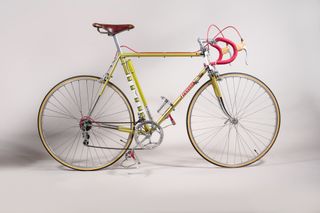
(Image credit: Future)
● Legnano Gran Premio, 1961
“It’s from 1961. The back end was bent and it had been painted with a rattle can in black. The only thing that made it recognisable as a classic bike was the head badge, which is quite iconic – the Legnano warrior. I had the back end straightened, re-chromed, and resprayed in the classic lizard green with red box lining by Dave Marsh at Universal Cycle Centre. Even my wife likes that!”
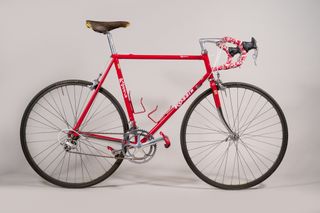
(Image credit: Future)
● Rossin, c. 1995
“I bought it from someone in Romania. It came from a factory liquidation sale. The bottom bracket was cracked but I also bought a Rossin Ghibeli BB with it. I got Rick Powell, the frame builder, to repair and respray it for me, and it’s a gorgeous frame.” Rather than a statement, the black tyres were “just what I had”, Howden adds.
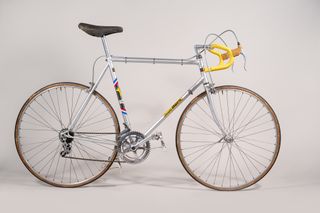
(Image credit: Future)
● Jacques Anquetil, c. 1970
“This is actually a Carlton [bike],” explains Howden. “Back in the day there was a deal done so that Anquetil bikes in Britain were made by Carlton. This is basically a Carlton Pro bike. On the Continent they were made by André Bertin. So the ones that the likes of Beryl Burton, Roy Cromack and John Watson rode, they were all Carlton Pros.”

